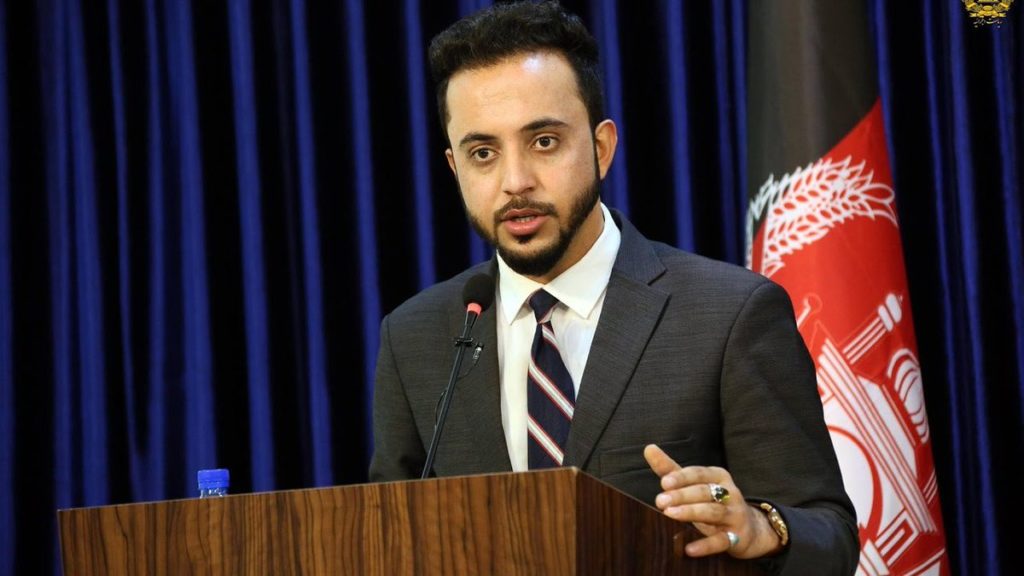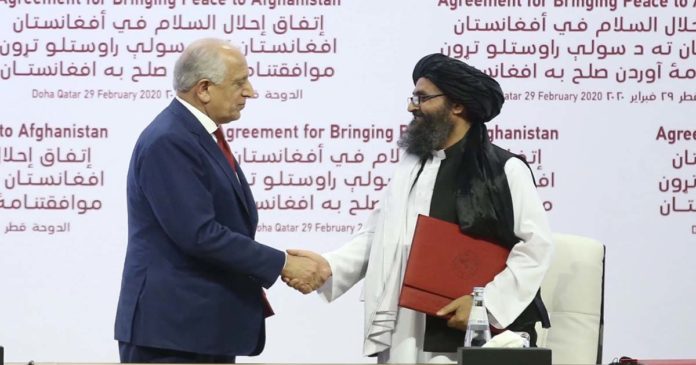Afghans are not known for abiding by treaties and agreements, they are also poor performers in handling intra-Afghan negotiations. Both the Taliban and the US troops are accusing each other of violating the peace agreement and the dysfunctional Afghan government is playing spoilers. May be implementation of the agreement is more messy than the process that led to signing the agreement.
Security in Afghanistan, even in the close proximity of strongholds of Occupation Forces, is precarious. An unknown gunman shot dead six local workers from the flagship American military base and wounded three others on April 17, barely about 500 meters from the premier Bagram air base. The gunman escaped. Taliban spokesman Zabihullah Mujahed said the group had nothing to do with the shooting. The Daesh affiliate is active in northern areas of Afghanistan and on April 9 it had claimed responsibility for firing five rockets from a vehicle at Bagram air base. There were no casualties. Afghan government spokesperson Shahkar said Afghan national security forces had begun an investigation to find the person who attacked the workers who provide cleaning services at the base.
Interestingly, during the winding talks between the US and Taliban, the American side had often questioned as to whether Taliban would be able to deliver on the terms of peace agreement. Paradoxically, it is the US side which appears unable to deliver. Its handpicked dysfunctional political dispensation of Afghanistan is playing spoilers. The Afghanistan Peace Agreement signed on February 29 had been touted to be the best chance to end the 18 year long war. Plans for a prisoner swap have faced opposition and hurdles from the start, threatening to unravel the agreement.
The Afghan government and Taliban are in the process of exchanging prisoners as part of a peace deal signed by the US and the Taliban on Feb, 29 in Doha. The release of up to 5,000 Taliban prisoners and 1,000 government personnel ahead of intra-Afghan negotiations is a condition of the US Taliban deal.
The US appears to be struggling to save Afghanistan Peace Agreement. Ambassador Zalmay Khalilzad and General Scot Miller visited Pakistan on April 14 to seek support for saving the pact. The Army Chief assured the duo of Pakistan’s support for this cause. A day earlier Khalilzad had met Mullah Abdul Ghani Baradar in Doha. Taliban political spokesman Suhail Shaheen said Mullah Baradar protested the attacks against Taliban fighters in their homes. “Our men have been targeted in their residential areas while there is no room for such attacks in the agreement, either by the US or their internal (Afghan) supporters,” Baradar said. The US military has refused to address the Taliban’s specific complaint but has said that it is abiding by the agreement and will continue to come to the aid of the Afghan military.
Afghan security forces claimed on April 11 that at least 27 Taliban were killed in the northern Badakhshan province. Taliban were killed in air and ground offensives in Warduj and Nusay districts. “No civilians have been harmed in these operations,” Rouhullah Ahmadzai, a Defense Ministry spokesman, said. The Taliban condemned these operations as “war crimes”. “Dozens of civilian homes have been demolished, many gardens and farms have been destroyed and heavy corporeal and financial losses inflicted on innocent villagers,” Zabiullah Mujahed, Taliban spokesman, said in a statement.
As regards exchange of prisoners, the Afghanistan government released 300 Taliban prisoners on April 09, claiming they were among 5,000 detainees to be freed under the Afghanistan Peace Agreement between Taliban and the US. Taliban said they have yet to verify those released were on the list they handed over to Washington during negotiations. Taliban political spokesman Suhail Shaheen in a message to Associated Press said Taliban doesn’t know who the government is releasing without verification. Taliban side has released 20 prisoners.
A prisoner exchange is meant to build confidence on both sides for intra-Afghan talks. Taliban say Afghan officials are trying to delay the release, while officials say the militants’ demands are unreasonable. Prisoner exchange is a confidence building measure. It was meant to trigger intra Afghan dialogue leading to end the war.
Matin Bek, Mr. Ghani’s head of local governance, told a news conference that the Taliban were demanding that the first batch of releases include about 15 senior commanders convicted of major attacks. “We cannot release the killers of our people,” he said. The US had agreed to the prisoner swap as a first step between the Afghan government and the Taliban, who are still technically at war. The Afghan government was not included in the talks. The government says it’s willing to release up to 400 low-threat Taliban prisoners as a goodwill gesture in return for a considerable reduction in violence.
As per the Peace Agreement document the US had committed that its 5,000 soldiers troops would leave the country by May. The process has already begun. The remaining US and Nato troops are slated to withdraw from Afghanistan within 14 months, provided Taliban uphold their side of the deal. Most of the international analysts opine that even if the Taliban abided by all provisions of agreement, the US is not likely to proceed with troop pullout beyond the magic 5000 figure.
America had also agreed to lift sanctions against the Taliban and work with the UN to lift its separate sanctions against the group. In return, the Taliban agreed not to allow Al-Qaeda or any other extremist group to operate in the areas they control.
Even after the Taliban released a statement saying they were pulling out of the talks, Afghan officials hoped another meeting between the technical teams scheduled for April 07 would go ahead, but it did not. The International Committee of the Red Cross, experienced in prisoner swaps, is a third party in the talks to help overcome mistrust.

It is not clear what particular point broke down the talks. “Discussions on release of Afghan security forces and Taliban prisoners had entered an important phase ahead of release,” said Javid Faisal, a spokesman for Afghanistan’s National Security Council. “Withdrawing from talks at such a time indicates a lack of seriousness about peace. We tried our best that they need to trust us, and we trust them as we have to work together. We thought their arrival in Kabul was a big step”, Javid added.
The Taliban insisted that the senior commanders be released in the first batch so they could help verify the rest of the 5,000 prisoners who had been expected to be released. Afghan officials offered a workaround: They could not release the senior commanders now, but those commanders could participate in the verification process and then return to prison. ABC has reported that a spokesman for the government said it would maintain its work on the prisoner release plan. “We ask the Taliban to not sabotage the process by making excuses now,” said Javid.
Mujib Mashal reported for Times that “Several Afghan officials aware of the discussions said the government had tried earnestly to use the opportunity of a Taliban delegation in Kabul to make progress. According to Associated Press’ Shaheen said the Taliban are ready to negotiate a countrywide cease-fire but only during intra-Afghan negotiations. However, intra-Afghan negotiations are held up by political turmoil in Kabul as the government “squabbles over the deal’s call for the release of 5,000 Taliban prisoners and 1,000 government prisoners”. “The Kabul regime is creating hurdles in the way of intra-Afghan negotiation by not releasing our prisoners as it is a prerequisite for commencement of intra Afghan negotiations,” Shaheen told The AP.
The Afghan government is under pressure from the US side for an aid slashing of the tune of $1 billion over differences between President Ghani and his political rival Dr. Abdullah Abdullah, which the Americans say has undermined the timelines of a tightly choreographed deal. Coupled with aid cut, Secretary of State Mike Pompeo had delivered a second stern message to Afghan leaders: that if they did not resolve their dispute to prioritize the peace talks, the United States could pull out all American troops.




